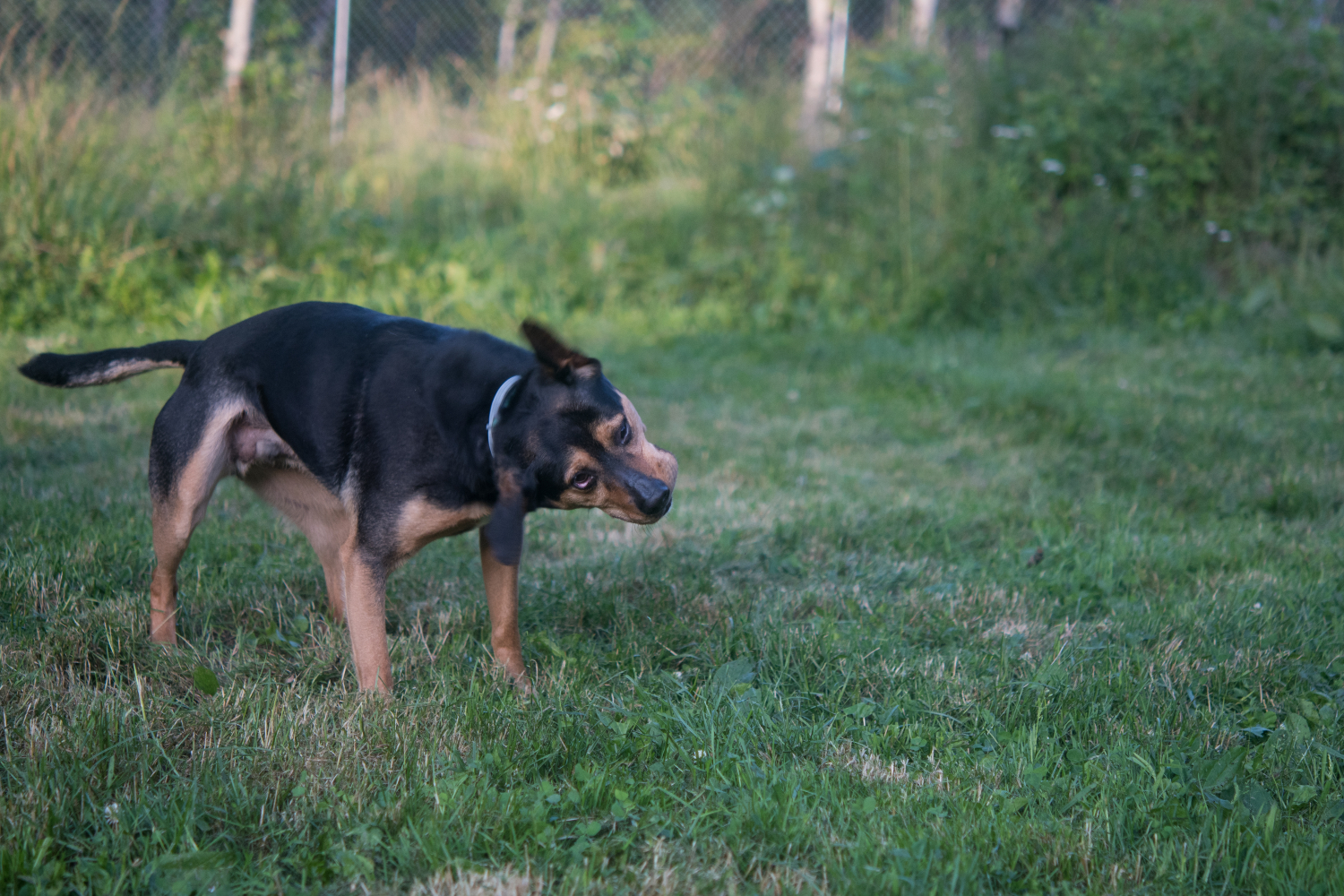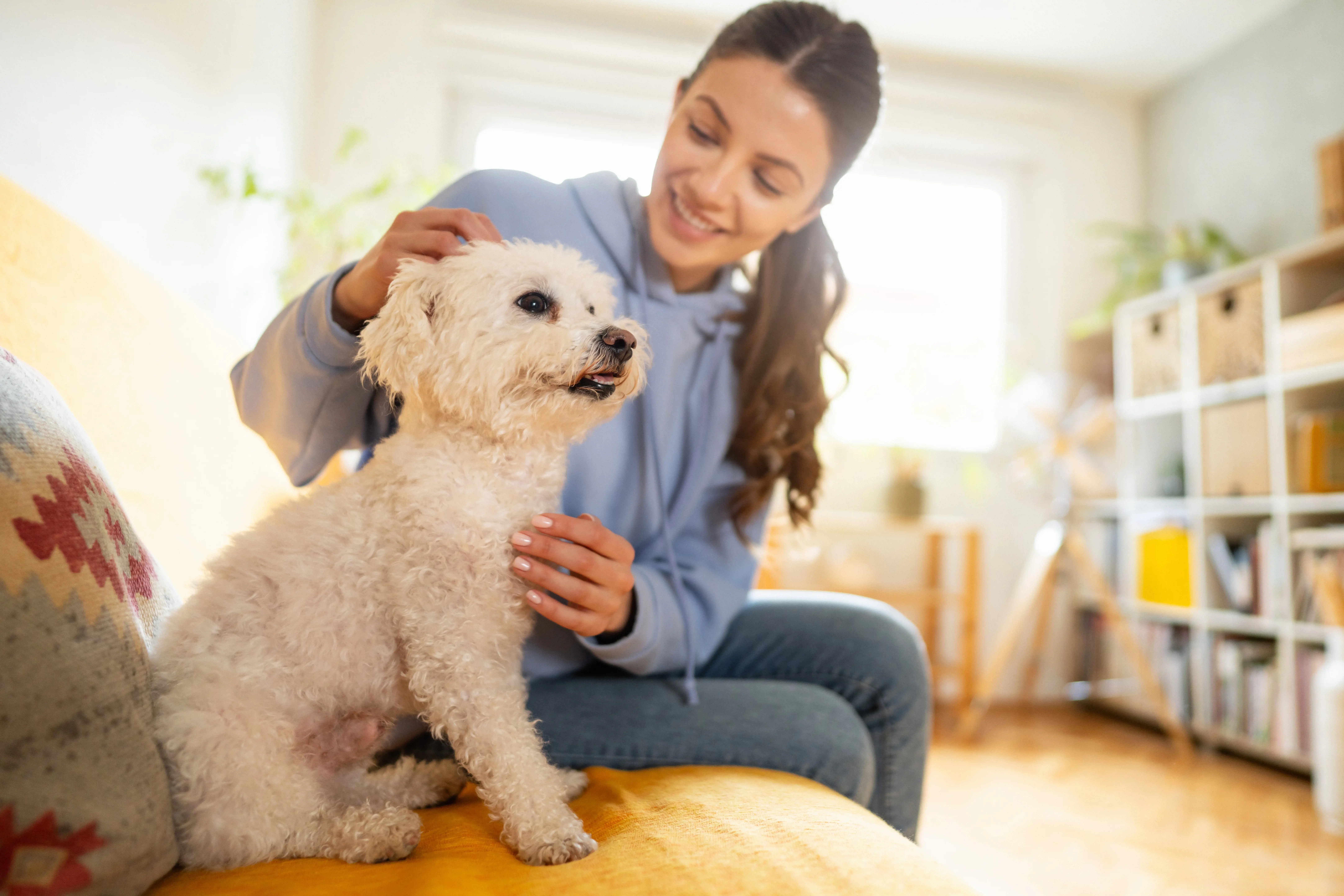Why is my dog shaking?
30th January, 2023

Dogs shake for many reasons – from feeling cold to experiencing pain. Should you be worried about your pet? What should you do? Our Purely Pets guide to shaking is here to help.
We understand what an important member of your family your canine friend is, so it’s only normal to worry when you see them shaking. But how do you know when they’re shivering with excitement or if it’s something more serious?
Below, we share everything you need to know about shaking dogs. Discover how to tell why they’re shaking and when it’s time to take them for a visit to the vet.
Do you need pet insurance in the UK? As a responsible owner, a lifetime policy like those from Purely Pets can cover your beloved pup through all stages of their life.
This way, whether your dog needs a quick visit to the vet or a treatment plan for its shaking, you can get help to cover the costs.
Why does my dog shake?
There are many reasons why your pet might be shaking, and we can divide them into three categories:
- Behavioural reasons, like feeling excited or scared
- Environmental reasons, like when they feel cold
- Medical reasons, including muscle weakness, feeling pain, or ear problems
When you take good care of your pooch with frequent vet visits, up-to-date vaccinations, and a healthy lifestyle, you can help lower the risk of some of these reasons.
Do you need pet insurance in the UK if you already look out for your dog? Yes, however well you treat your furry family member, health issues can arise at any time.
Lifetime coverage makes sure they get the care they deserve in times of need without the financial worry, like when their shaking is a sign of something more serious.
Behavioural reasons why a dog might shake
When you notice your pet shaking, it doesn’t always signal something negative. Extreme emotions on either end of the spectrum can cause your dog to shake. They might feel excited, but it can also be a sign of fear or anxiety.
In both cases, your dog’s anatomy suddenly releases hormones, causing a major impact and shaking.
Excitement
Have you ever noticed your dog shaking when they play with you, when you mention ‘walkies’, or when you get home from work? Your pet is likely very excited at that moment or knows something fun is about to happen.
This trait is particularly common in younger dogs and displays sheer joy and an overwhelming sense of happiness. If your dog sometimes shakes in these situations and calms down again after, then there’s nothing to worry about.
To help your dog return to its regular state quickly, keep things relaxed when they become hyperactive. This should help them calm down and stop the shaking behaviour.
Anxiety, stress, or fear
Although shaking is sometimes due to positive emotions, it can also be a symptom of negative feelings due to fear, stress, or anxiety. When your pet feels unsafe, their body tells them to defend themselves or even run away. It’s the common fight or flight response. Read our blog on how to make your pet happier to learn on how you can help your pet.
When adrenaline fills their body, their muscles prepare for action, and they sometimes start shaking. A common cause of these negative reactions is thunderstorms and fireworks.
Shaking for these reasons is usually not cause for concern, but you can help them manage their anxiety levels.
Other symptoms of fear and stress in dogs include:
- Whimpering
- Panting
- Hiding
- Flattening their ears
Do you need pet insurance in the UK if your pooch experiences these emotions? These feelings of negativity can have a severe impact on your dog’s overall happiness if they experience them all the time.
A visit to your vet or animal behaviourist may help discover the reasons why they feel this way and they can talk to you about anti-anxiety medication. A comprehensive insurance plan for your pet can help with vet bills and reduce the impact on your wallet.
Although it must be noted that behavioural treatment is not covered until the policy has been active for 24 months and is only covered if the behaviour is not a result of a lack of training or socialisation.
Environmental reasons for dog shaking
If you don’t think your dog is shaking due to behavioural factors, it might be because of the environment. When your animal feels very cold or wants to get rid of excess water on its body, it’s normal for them to shake.
They feel cold
Just as we shiver to keep us warm in the winter, dogs do the same. Shaking for this reason is an involuntary response to dropping temperatures and helps your pet warm up.
How does it generate heat in your dog? The act of shivering forces muscles to tighten and relax quickly, which helps raise your pup’s body temperature.
Dogs with thinner coats, which are small, or have a slim build are more likely to shiver because they can’t retain heat for as long as other types. If you spot your pet shivering when you’re out for a walk, help them warm up when you get home.
If your pup is especially prone to the shivers, consider buying them some cute boots or a coat to hold in their body heat.
To shake off water
Every dog owner knows that when their pet gets out of the bath or enjoys a swim in the river, the first thing they do afterwards is have a good shake – and everyone around them gets wet!
Why don’t they let their fur dry naturally? A dog’s coat is there to keep them warm and does an excellent job at trapping heat. The downside? It’s also great at holding water, which can cause their core temperature to drop and make them start shivering.
By shaking off up to 70% of the water on their fur in just a few seconds, your pup is being more energy efficient.
Do you need pet insurance in the UK? Your pet doesn’t need to see a vet when they shake for this reason but having a policy in place helps to alleviate the financial pressure and helps in preventing your delay in seeking treatment if another health issue arises.
Medical reasons that make a dog shake

Often, your dog’s shaking is likely due to behavioural or environmental causes. Sometimes, though, the shivering and muscle tremors are a sign of something more serious and could mean your pet is experiencing health problems, including:
- Pain
- Distemper
- Nausea
- Ear problems
- Muscle weakness
- Epilepsy
- Poisoning
If you’re worried about your four-legged friend’s behaviour or health, it’s time to call the vet. Do you need pet insurance in the UK? Look for a policy that offers a 24-hour video consultation service like Purely Pets.
We’ve partnered with experienced vets at Joii Pet Care to help you get your pet-related queries answered quickly in the comfort of your own home, and at a time that suits you.
If you notice your animal shaking and are concerned, you can call day or night and get help identifying the problem and may even receive a treatment plan.
Pain
As dogs are great at hiding when they feel pain, it’s sometimes difficult to know when they’re hurting. Shaking and shivering can be a good indicator that they are in pain, along with other signals, like:
- Seeming sad or down
- Licking or scratching the same area
- Flattened ears
- Limping or stiffness
- Less appetite
If you suspect your animal is in pain, contact the vet right away. Make sure to note any of the symptoms you see and work together with the vet to discover why your pet is hurting.
The reason could be anything from a chronic condition to an acute injury.
Distemper
This nasty virus attacks your dogs’ organs and can become very serious and even fatal in severe circumstances. Small puppies and young pets are at a higher risk as they haven’t been fully vaccinated.
In addition to shaking, dogs may develop:
- Tiredness
- Coughing
- Runny nose
- High temperature
- Sickness
- Little to no interest in eating
Luckily, the disease is a rare condition nowadays as the distemper vaccination is “one of the four main ones all puppies should receive” according to the Kennel Club.
Do you need pet insurance in the UK to vaccinate your pup? Insurance policies don’t cover vaccinations, but you might find your dog is exempt from certain treatment being covered under the policy if they aren’t up to date with vaccines.
If your pet falls ill due to a condition that could have been prevented by vaccination, the cost may not be covered by your policy. Read your policy documents carefully to see exactly what is and isn’t included.
Nausea
Your pet might shake and shiver when they feel unwell, just like us, especially if they feel like they might be sick. You can tell your dog is feeling nauseous if they keep licking their lips, dribbling excessively, or swallowing repeatedly.
Common causes of feeling ill include eating too much or something poisonous, motion sickness, or other medical conditions. Contact your vet at once if your pet is very ill, as they may have swallowed something dangerous.
Ear problems
Does your dog shake their head a lot? They may have an ear problem. There are lots of reasons why your pets’ ears could be causing them distress, including:
- Infection
- Fleas
- Ear mites
- An allergic skin disease
- Something stuck inside
- Aural haematoma
- Injury
- Lump in the ear
If you notice your furry friend shaking their head more than normal or scratching their ears excessively, take them to the vet. The quicker they diagnose the issue, the easier it is to treat.
Remember with Purely Pets, you could take advantage of the 24/7 vet video calls to get a quick professional opinion, potentially saving you a trip to the vet.
Muscle weakness
If your dog shakes a lot in a specific area, especially their legs, they may have muscle weakness or fatigue. If you notice this after a run or long walk, they could just be tired from so much exercise and need a rest to help it subside.
When a pet’s leg shakes more often, they might have weak muscles. Take a trip to the vet for some suggestions on how to build up their muscle strength. This could include swimming or adapting their exercise routine.
If your pet is older and has shaky legs, it may signal muscle weakness, but can also be a sign your dog is suffering from acute joint pain or a chronic condition like arthritis. It could also be a sign of a neurological condition.
Epilepsy
The most common neurological condition in pets is epilepsy, and around one in 130 dogs in the UK are affected by the disorder. The chronic condition causes a varying range of effects, like head shaking, stiffness, restlessness, jerking, collapsing, and loss of consciousness.
To avoid repeated seizures and possible danger to your animal, long-term medication is often prescribed.
Do you need pet insurance in the UK if your dog suffers from epilepsy? Regardless of whether your pup has the disorder or not, you should always have cover to help with vet bills and emergencies.
Having a comprehensive plan in place may mean you get help with vet visits and treatment for the condition.
Poisoning
Not every poison causes the same reaction in canines, but some of them can make your dog shake or twitch. Common poisons that might be lurking around your house are:
- Cigarette butts
- Caffeine
- Chocolate
- Mouldy foods
- Slug bait with metaldehyde
- Macadamia nuts
- Cannabis
- Xylitol
A majority of those listed pose a real danger to your pet and need to be kept somewhere your pet can’t find them. If you believe your dog might have been poisoned by one of the above, get them to the vets immediately.
Do you need pet insurance in the UK to cover your dog in case of poisoning? If you have a lifetime policy for your pooch, due to the financial pressure being less.
When you insure your dog with Purely Pets, you get access to the 24-hour video calling service, meaning you can get the right advice quickly to treat your pup.
What is generalised tremor syndrome (GTS)?
This condition can show up in any canine, whatever their size, or breed. You can usually spot the signs when your pup is between 9 months and 2 years old. Sometimes the shaking is only in specific areas and other times it can be all over.
No one is certain of the cause of GTS, sometimes called steroid responsive tremor or shaker syndrome, but many believe it stems from autoimmune origins.
If your pooch has the condition, it’s not usually cause for concern, but speak to your vet if you’re worried about its wellbeing as a result.
Why is my puppy shaking?
It can be more worrying to see a puppy shaking than their older counterparts due to their smaller size and delicate immune systems. If your puppy is shivering a lot, call your vet for advice as soon as possible. A few conditions can cause the shaking, including:
- Cerebellar Hypoplasia: This condition occurs when the part of your puppy’s brain that controls their coordination doesn’t develop properly. Other symptoms in addition to shaking include leg tremors, falling over, and head bobbing.
- Hypomyelination: This condition is sometimes called shaking puppy syndrome and happens when your pet has an issue with its nerves. You may spot signs as young as two weeks old, like shaking or trouble balancing and walking.
Do you need pet insurance in the UK for a puppy? Yes, any responsible dog owner will get coverage for their pet as soon as they can if there are any concerns about affording unexpected vet bills.
At Purely Pets, we can insure your tiny bundle of fur from as young as 8 weeks of age.
Other reasons for dog shaking and shivering
In this article, we’ve discussed some of the more common reasons your dog might be shaking. There are other rarer medical causes for shivering or shaking, including:
- Inflammatory brain conditions
- Kidney failure
- Hypocalcaemia, or low calcium levels
- Hypoglycaemia, or low blood sugar
- Addison’s disease
Taking your pet to the vet can help find the cause of your dog’s shaking and treat it as soon as possible.
When should I take my shaking dog to the vet?
With such a wide range of shaking causes, it might be difficult to know when your dog needs to see a vet. Some shake due to natural and non-harmful reasons, but they may also feel sick or have an underlying condition.
If you notice your dog acting strangely or that their shaking doesn’t subside when they feel calm, warm, and dry, it’s time to give the vet a call.
When your pet shakes excessively or the shivering is accompanied by other symptoms, take them to the vet at once.
Find pet insurance for your pup

As a responsible pet owner, you want to keep your animal out of harm's way and protect their health. Whether your dog’s shaking is something minor or perhaps a little more serious, you need to get them checked by a vet.
Healthcare bills can soon mount up but finding a comprehensive insurance policy to cover your dog means you can protect yourself against hefty bills – especially when it comes to emergency care.
Here at Purely Pets, we know how much your furry friend means to you and that you’ll want to protect them throughout their lives. That’s why we help dog owners across the UK find the ideal policy for their pet, needs, and budget.
Choosing coverage with us means you and your pooch enjoy (*terms, conditions and exclusions apply):
- A policy from 8 weeks of age with no upper age limit
- Direct payments to your vet
- Access to the 24-hour video consultation service with fully qualified veterinary professionals
- A range of lifetime policy options, offering cover from £1,000-£15,000
- An online policy management portal so you can manage your policy at a time to suit you
Do you need pet insurance in the UK for your furriest family member? Get in touch with the Purely Pets team today and get a quick quote.
No matter how young or old your dog is, they’re a lifelong companion. We’re here to support you and your pet whatever life throws your way.
Helpful Pages
Recent Posts
Pet Insurance Quote
- 98% claims paid *
- Claims paid directly to vets
- 24/7 vet video consultations
- Interest free monthly payments




